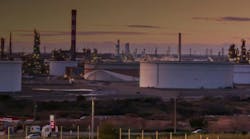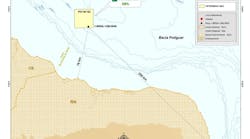Despite the 6.1 billion franc record profits last year of the seven companies that comprise France's refining industry, their profitability remains insufficient to cover the big investments they will have to make in order to meet European Union specifications for fuels in 2005.
Union Française des Industries Pétroliéres (UFIP) Pres. Philippe Trépant recently delivered that warning at a news conference. France's refiners are Total, Elf Aquitaine, Exxon Corp., Royal Dutch/Shell, BP Amoco plc, Mobil Corp., and Petrofina SA. (Total and Petrofina have agreed to merge, as have Exxon and Mobil.)
Returns inadequate
While France's strong domestic demand for refined products totaled 88.9 million metric tons in 1998, refinery utilization reached 96%, which, when coupled with productivity gains, bolstered margins and pulled profits to a level not seen since 1986.Even so, the return on capital employed did not go beyond 8%, when "It should hover between 10% and 15% to satisfy shareholders and warrant making investments," noted Trépant, who noted that France's Energy Planning Commission had stressed that it would cost 50% more for France's refining industry to meet 2005 specs than for its European counterparts.
This stems from French refiners' lack of conversion capacity to deal with unneeded heavy fuel oil and their inability to balance increasing diesel oil needs and declining gasoline consumption in France. Although the tax on diesel oil is gradually being increased, the domestic consumption gap between it and gasoline continues to widen, as last year 6 million tons of diesel had to be imported into France, and 4 million tons of gasoline were exported.
France's refining industry also has been handicapped by a number of taxes that are either no longer adapted to its special circumstances, such as the tax on profits not yet accrued from products in inventory, or are specific to France, such as the professional industry tax and higher gasoline taxes-which drive motorists in border areas to fill their tanks in another country.
With refining overcapacity in Europe hovering at the equivalent of 10-15 refineries, and capital spending estimated at 1 billion francs/refinery needed to meet 2005 specs, arbitration on closures soon will have to take place, warned Trépant.
Tax concerns
The industry is also worried, said Trépant, by the proposed "ecotax" project being mulled by the government, which could endanger the last markets for heavy fuel oil in France, as well as erode industry's overall competitiveness.Although slumping oil prices last year turned out to be a boon for refiners, the exploration-production sector in France was badly hit. Trépant indicated that 51 wells out of the country's 470 producing ones had been shut down, some of them irretrievably during October 1998-February 1999.
In addition to low oil prices, UFIP blames a tax that applies to every ton of hydrocarbons produced in France at a rate tied to gross domestic product, irrespective of the product's market value.
Copyright 1999 Oil & Gas Journal. All Rights Reserved.

